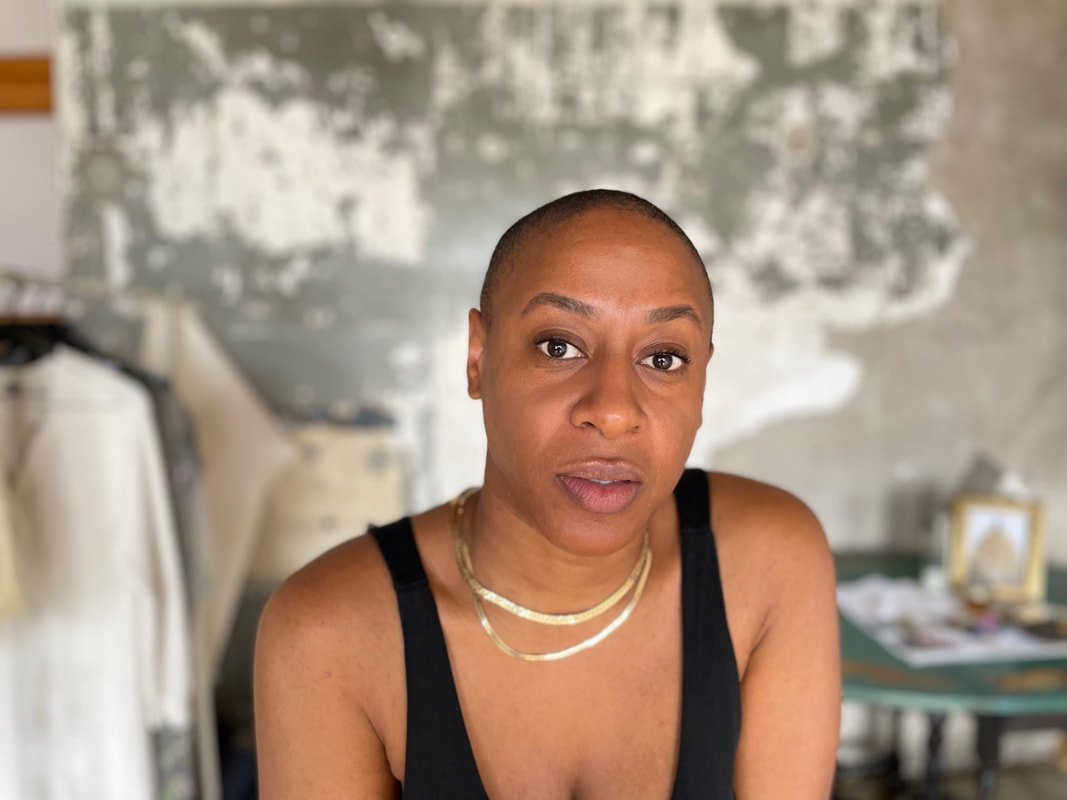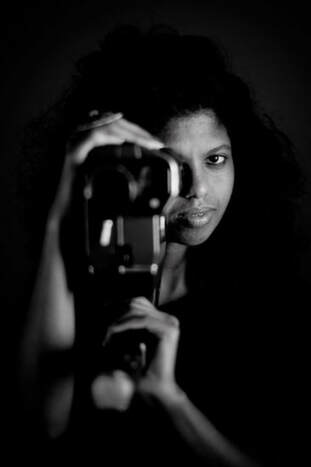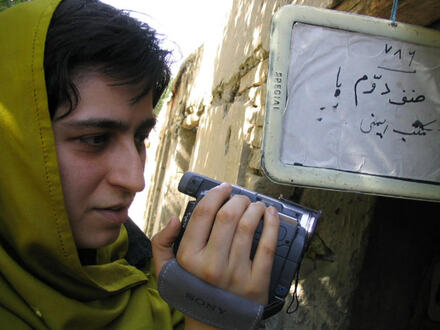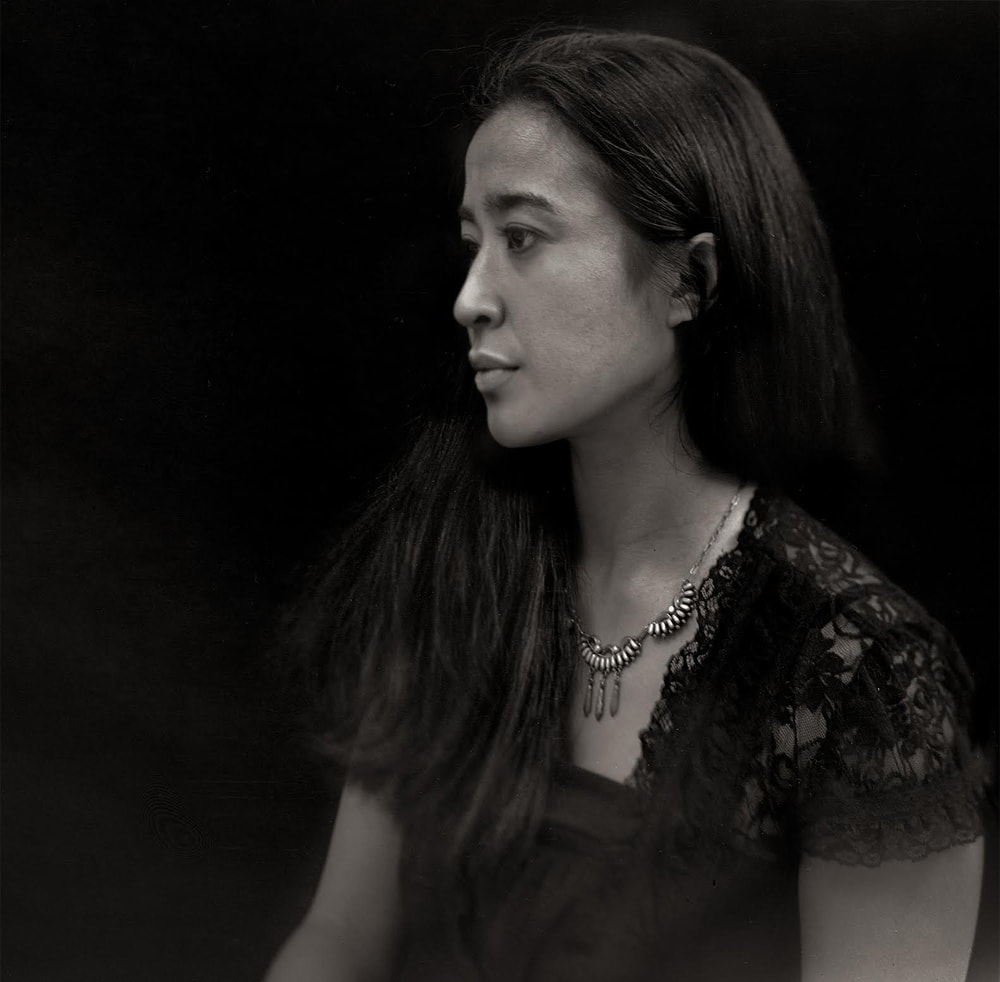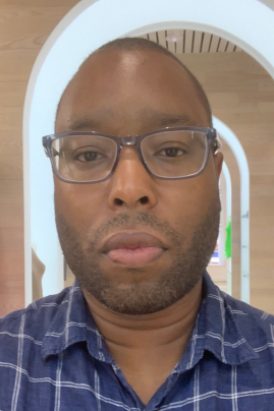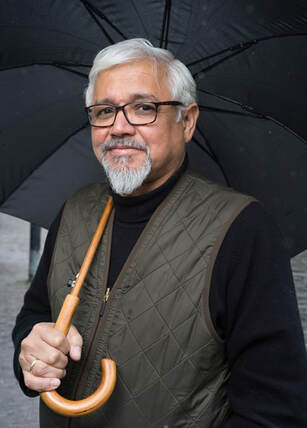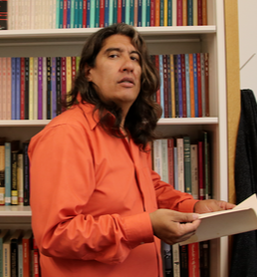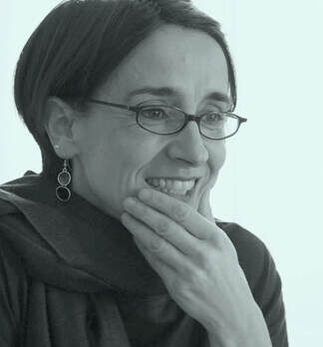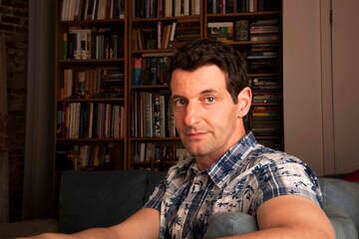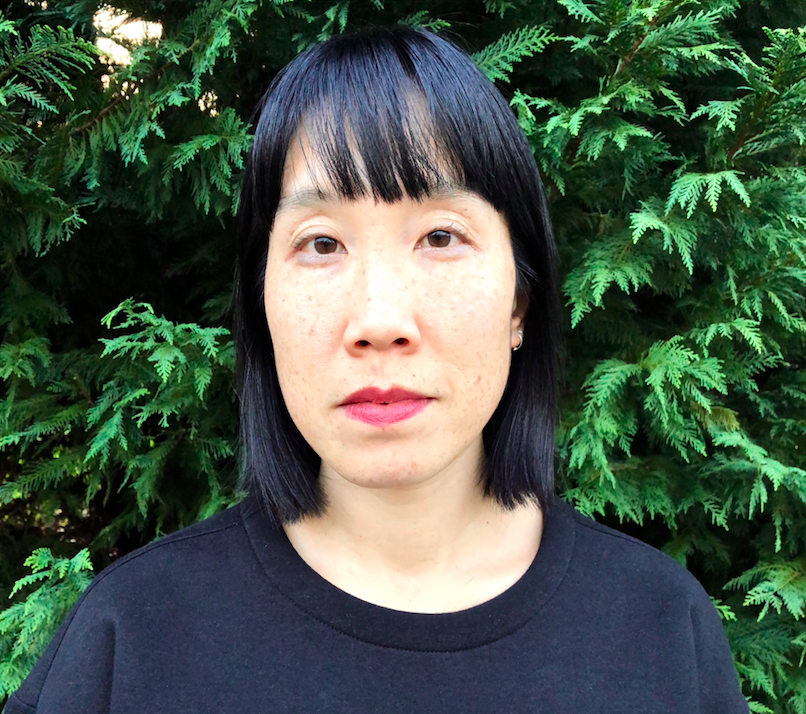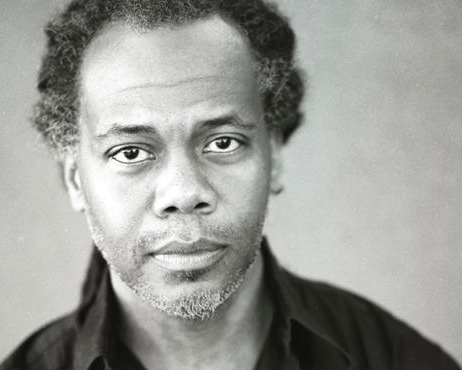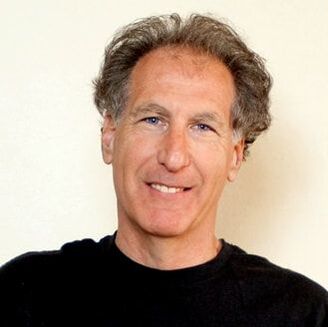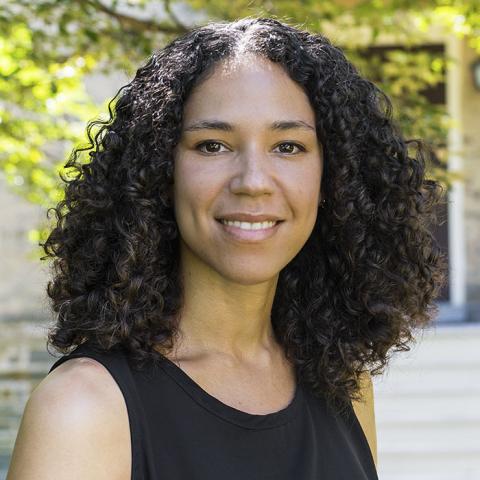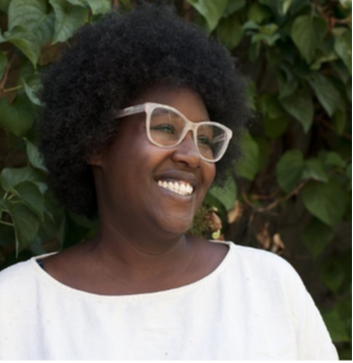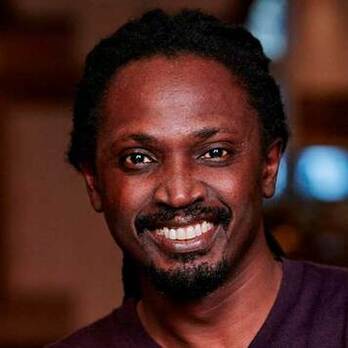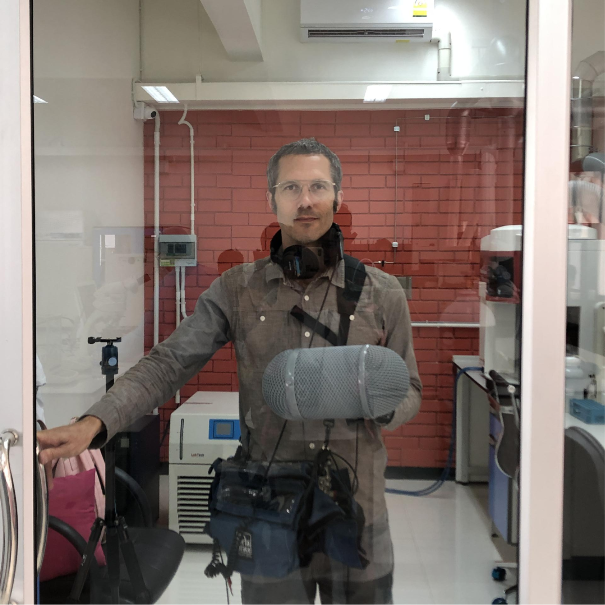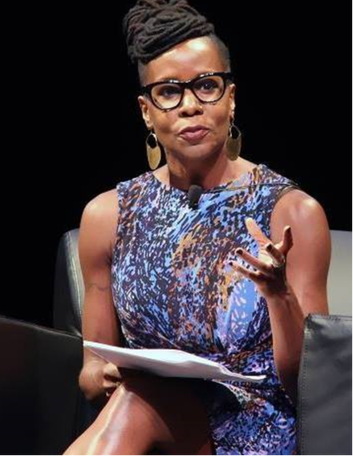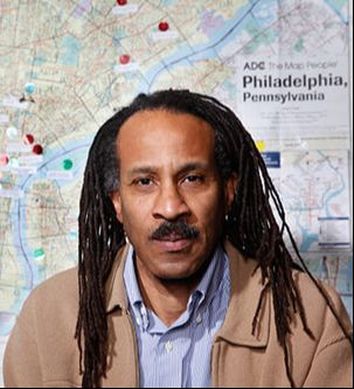CEE | Center for Experimental Ethnography
Menu
CENTER FOR EXPERIMENTAL ETHNOGRAPHY
Emergent Storytelling | 2023-2024 theme
FALL 2024 FEllows
CAMP: Shaina Anand and Ashok Sukumaran |
CAMP (founded by Shaina Anand and Ashok Sukumaran in 2007) is a Mumbai-based studio of people who are artists, architects, filmmakers, and technologists. They host long-running video archives Pad.ma and Indiancine.ma, a rooftop cinema for the past 15 years, and make art that is possessed of an infrastructural imagination. CAMP’s artworks have been exhibited in biennales, museums and film festivals worldwide, and in the streets, markets and neighbourhoods of Bangalore, San Jose, Dakar, Mexico City, Jerusalem, Kolkata, Kabul, Delhi, Ljubljana, Münster and Bombay and are in the permanent collection of major museums. Recent shows include solos at Sharjah Art Foundation, (2022) Nam June Paik Art Center (2021), Argos Center for Art and Media, Brussels, and the De Appel Gallery, Amsterdam (2019) and performances at M+,HongKong (2023) and MoMA, New York (2023). In 2020 they were awarded the 7th Nam June Paik Centre Prize. CAMP were Forensic Architecture guest professors for 2023-2024.
Individual:Ashok Sukumaran (born 1974) studied architecture and media art, and has broad interests in technology, media and its “earthing”, which he has explored by leading artistic projects on seas, roads, housing and electricity among other subjects, in South Asia and elsewhere. He is the winner of a Golden Nica award at Prix Ars electronica in 2007, and a UNESCO digiarts award in 2006. Shaina Anand (born 1975) studied film and media art, and has run an independent film and art practice since 1999. She co-initiated the Pad.ma footage archive in 2008, and the Indiancine.ma archive in 2013. Her practice comes from a located critique of documentary film and forms of address, and an expansion into methods engaging with archives, surveillance, subject awareness and collectivity. |
spring 2024 FEllows
Ra'anan AlexanderwiczERnesto Pujol
|
Ra'anan Alexandrowicz is an Israeli filmmaker and screenwriter currently living in Philadelphia . Some of his achievments include the Grand Jury Award at Sundance and a Peabody award for his experimental documentaries that deal with the violence, ethical suspensions, and military, legal, and visual frameworks underlying the occupation of Gaza and the West Bank (and the treatment of Palestinians in Israel). Films include The Inner Tour, The Law in These Parts and The Viewing Booth. While a fellow at CEE and in light of the devastating events in Palestine / Israel, Ra'anan's seminar will pivot to focus on the Israeli-Palestinian conflict through cinematic reflection. The course, featuring film screenings of Israeli and Palestinian works, will delve into key historical periods in the conflict to foster a more nuanced understanding of the present. It will use cinema as a lens to study the century-long war and critically assess the role of audio-visual media in historical narratives. The main goals are to provide students with nuanced knowledge about the history of the conflict and create an inclusive space that allows an open and honest dialog about facts and events - as well as an inquiry into the very language we use to speak of them. Using the history of both Israeli and Palestinian cinemas as a vehicle to study history of the conflict itself provides an engaging way to look into the two peoples and the century long war between them, but also an opportunity to critically look at the positive and negative roles of the audio-visual medium in the context of historical narratives and events. Ernesto Pujol is a multi-disciplinary queer maker who conceptualizes & curates group performances as social choreography; designs native edible horticultural spaces of historical memory for collective healing; and generates creative critical writing and transformative field education workshops. Pujol's complex projects result from trust-based ethical collaborations with gatekeepers & stakeholders in communities across the globe. Pujol believes the creative tools of ecologically and socially-engaged cultural producers are more relevant than ever within increasingly diverse impoverished societies seeking sustainability in the Post-Democratic Age of Extinction. Through grounded psychic acuity, Ernesto portrays the human condition's ongoing desire for transcendence in the face of human rights violations & climate crisis. Ernesto counteracts the cult of speed and the culture of spectacle by revisiting emblematic architecture and mythical landscapes through contemplative presence. These public interventions have consisted in full-immersion environments and repetitive cartographic walks with menus of minimal gestures, from slowness to stillness, all shrouded in silence for deep listening to encourage the awakening of consciousness. Ernesto Pujol is the author of Sited Body, Public Visions (2012) and Walking Art Practice (2018). Artist interviews & essays are found in publications such as The Brooklyn Rail (Vulnerability as Critical Self-Knowledge, 2013), Fernweh: A Travelling Curators’ Project (An Atlas of Small Places, 2015), and Awake: Buddha Mind in Contemporary Art (2004). |
FALL 2023 FELLOWS
Jennifer harge |
Jennifer Harge is an interdisciplinary choreographer, performance artist, and educator based in Detroit, MI. She approaches creative practice as a space to design and execute strategies to thrive in Blackqueer flesh. She privileges her interiority and subjectivity as form to move from/move with/reroute/reimagine/reinvent the stories sitting in her blood memories.
She most recently served as the Alma Hawkins Visiting Chair in Dance at UCLA where she taught studio courses on Black Feminist spatialities and Black compositional thought (word to Torkwase Dyson). She is currently developing FLY | DROWN, a multi-form fable series centering Black sovereignty. While in residence at the Center for Experimental Ethnography, Harge will teach a graduate seminar on Black Feminist Thought and Performance Composition. Informed by theories of time, space, presence, and the body, the course will work from movement-based investigations prompted by a range of Black feminist texts and performances to position performance composition as a site of research, intervention, ritual, and protest. |
sosena solomon
|
Sosena Solomon is an Ethiopian-American social documentary film and multimedia visual artist whose work explores cross-sections of various subcultures and communities in flux, carefully teasing out cultural nuances and capturing personal narratives through arresting visual storytelling. Solomon has worked for many years in the commercial and nonprofit sectors as a director and cinematographer on many short film projects, including Dreaming of Jerusalem, a Discovery-plus original documentary about the Ethiopian Jewish community in Gondar; and MERKATO, filmed on location in one of Africa’s largest open-air markets and exhibited internationally as an audio, visual, and sensory installation. She has exhibited work at the Sundance Film Festival, Cinema Africa, Tribeca, and DOC NYC. She earned her BA in Television Production from Temple University and her MFA in Social Documentary film from The School of Visual Arts. Solomon is currently working with The Metropolitan Museum of Art to create new digital and in-gallery content that will reframe the Museum’s African art galleries.
|
SPRING 2023
Wazhmah Osman
|
Wazhmah Osman is an Afghan-American academic and filmmaker. She is currently an associate professor in the Klein College of Media and Communication at Temple University. Her research and teaching are rooted in feminist media ethnographies that focus on the political economy of global media industries and the regimes of representation and visual culture they produce. In her book Television and the AfghanCulture Wars: Brought to You by Foreigners, Warlords, and Activists (University of Illinois Press, Fall 2020), she analyzes the impact of international funding and cross-border media flows on the politics of Afghanistan, the region, and beyond. She is also the codirector of Postcards from Tora Bora (Documentary Educational Resources, 2007) and the coauthor of the forthcoming Afghanistan: A Very Short Introduction(Oxford University, forthcoming). She has appeared as a commentator on Democracy Now, NPR, and Al Jazeera and works with community and activist groups.
Wazhmah Osman is an Afghan-American filmmaker and associate professor in the Klein College of Media and Communication at Temple University. She is the author of Television and the AfghanCulture Wars: Brought to You by Foreigners, Warlords, and Activists (University of Illinois Press, Fall 2020). She is also co-director of the critically acclaimed documentaryPostcards from Tora Bora and the co-author of the forthcoming Afghanistan: A Very Short Introduction (Oxford University Press). |
Imani Uzuri
|
Photo credit: Petra Richtervova
|
Imani Uzuri, raised in rural North Carolina, is an award-winning vocalist, composer, experimental librettist, and improviser called “a postmodernist Bessie Smith” by the Village Voice. She composes, performs, and creates interdisciplinary works (for theater, ritual performance, chorus, chamber ensemble, sound-art and film) often dealing with themes of ancestral memory, magical realism, liminality, Black American vernacular culture, spirituality and landscape. Her ritual performance Wild Cotton was cited as one “with subtlety and vision” by the New York Times. As a Jerome Foundation Composer/Sound Artist Fellow Uzuri began making international sojourns to over 30 shrines as embodied research for her forthcoming ritual opera celebrating the holy iconography of the Black Madonna. Recently in support of this new work, she was a Camargo Foundation Composer-In-Residence in Cassis, France.
Uzuri has been commissioned by Banff Centre for Arts and Creativity, Harvard Fromm Players and The Ford Foundation. Her Chamber Music America New Jazz Works commission She Knows Suite premiered at Lincoln Center Atrium in February 2020. Uzuri received her MFA from Goddard College Vermont and her M.A. in African American Studies from Columbia University. Uzuri was a 2019-2020 Harvard University W. E. B. DuBois Hutchins Center Fellow in support of her forthcoming experimental chamber opera Hush Arbor (The Opera). From 2020-2022 Uzuri has created various experimental solo ritual performances centering themes of sanctuary and healing. |
FALL 2022 FELLOWS
SAYA WOOLFALK
|
Saya Woolfalk (Japan, 1979) is a New York based artist who uses science fiction and fantasy to re-imagine the world in multiple dimensions. With the multi year projects No Place, The Empathics, and ChimaTEK, Woolfalk has created the world of the Empathics, a fictional race of women who are able to alter their genetic make-up and fuse with plants. With each body of work, Woolfalk continues to build the narrative of these women's lives, and questions the utopian possibilities of cultural hybridity.
She has exhibited at museums, galleries, and alternative spaces throughout Asia, Europe and the United States including solo exhibitions at the Montclair Art Museum, Montclair, NJ (2012); the Chrysler Museum of Art, Norfolk, VA (2014); the Asian Art Museum of San Francisco (2014); SCAD Museum, Savannah, GA (2016); Everson Museum of Art, Syracuse, NY (2016); Sheldon Museum of Art, Lincoln, NE (2016); the Mead Museum of Art, Amherst, MA (2017) and group shows at the Studio Museum in Harlem; MoMA PS1, Long Island City, NY; the Warhol Museum, Pittsburgh, PA., the Museum of Contemporary Art, Chicago, among many others. |
Works by the artist are in the collections of major institutions including, among others, the Whitney Museum of American Art; the Mead Art Museum, the Weatherspoon Art Museum; the Newark Museum; the Chrysler Museum of Art; and the Seattle Art Museum where her major multi-media installation, commissioned and acquired by the Museum, is on extended view. Solo exhibitions of works by Saya Woolfalk are also currently on view at the Nelson-Atkins Museum, Kansas City, MO (through September 1, 2019) and the Kohler Art Center, Sheboygan, WI (through August 18, 2019).
Woolfalk is the recipient of numerous honors, awards, and commissions. She has delivered numerous public lectures at museums and universities throughout the United States including a recent TED X Talk. She is represented by Leslie Tonkonow Artworks + Projects, New York and teaches in MFA program at Yale School of Art as well as in the BFA and MFA programs at Parsons: The New School for Design.
Photo by LaMont Hamilton.
Woolfalk is the recipient of numerous honors, awards, and commissions. She has delivered numerous public lectures at museums and universities throughout the United States including a recent TED X Talk. She is represented by Leslie Tonkonow Artworks + Projects, New York and teaches in MFA program at Yale School of Art as well as in the BFA and MFA programs at Parsons: The New School for Design.
Photo by LaMont Hamilton.
Cover image: Saya Woolfalk: Visionary Reality Outpost Installation View John Michael Kohler Arts Center, Sheboygan, WI 2019
DAMANI PARTRIDGE
|
Damani J. Partridge is a Professor of Anthropology and Afroamerican and African Studies at the University of Michigan. He is also an affiliate with the Department of Germanic Languages and Literatures and has published broadly on questions of citizenship, affect, urban space, sexuality, decolonization, post-Cold War “freedom,” Holocaust memorialization, African-American military occupation, Blackness and embodiment, the production of noncitizens, the culture and politics of “fair trade,” and the Obama moment in Berlin. He has also made and worked on documentaries for private and public broadcasters in the United States and Canada, and currently directs the Filming Future Cities Project in Detroit and Berlin (see filmingfuturecities.org). His first book, Hypersexuality and headscarves: Race, sex, and citizenship in the new Germany, was published in the New Anthropologies of Europe series with Indiana University Press in 2012. His forthcoming book, Blackness as a universal claim: Holocaust heritage, noncitizen politics, and Black power in Berlin will be published with the University of California Press in 2022.
|
Selected Publications
“We Were Dancing in the Club, Not on the Berlin Wall: ‘Black’ Bodies, Street Bureaucrats, and Exclusionary Incorporation in the New Europe,” Cultural Anthropology, Vol. 23, No. 4, pp. 660–687.
“Holocaust Mahnmal (Memorial): Racial Memory Amidst Contemporary Race,” Comparative Studies in Society and History, Vol. 52, No. 4 (October), pp. 820-850.
Corporate Lives. Special issue of Current Anthropology, co-edited with Marina Welker, and Rebecca Hardin. Vol. 52, Supplement 3 (April).
2019 Interrogating ‘Diversity.’ Special Issue of Public Culture, co-edited with Matthew Chin. Volume 31, Number 2 (May).
“We Were Dancing in the Club, Not on the Berlin Wall: ‘Black’ Bodies, Street Bureaucrats, and Exclusionary Incorporation in the New Europe,” Cultural Anthropology, Vol. 23, No. 4, pp. 660–687.
“Holocaust Mahnmal (Memorial): Racial Memory Amidst Contemporary Race,” Comparative Studies in Society and History, Vol. 52, No. 4 (October), pp. 820-850.
Corporate Lives. Special issue of Current Anthropology, co-edited with Marina Welker, and Rebecca Hardin. Vol. 52, Supplement 3 (April).
2019 Interrogating ‘Diversity.’ Special Issue of Public Culture, co-edited with Matthew Chin. Volume 31, Number 2 (May).
Cover image: Book Cover Page for "Hypersexuality and Headscarves" by Damani Partridge
SPRING 2022
AMITAV GHOSH
|
Amitav Ghosh was born in Calcutta and grew up in India, Bangladesh and Sri Lanka. He is the author of two books of non-fiction, a collection of essays and ten novels. His books have won many prizes and he holds four honorary doctorates. His work has been translated into more than thirty languages and he has served on the Jury of the Locarno and Venice film festivals. In 2018 he became the first English-language writer to receive India’s highest literary honor, the Jnanpith Award. A recent publication of his is Jungle Nama, an adaptation of a legend from the Sundarban, with artwork by Salman Toor. His new book, The Nutmeg’s Curse; Parables for a Planet in Crisis, a work of non-fiction, was published in October 2021. He lives in Brooklyn, New York, with his wife, the writer Deborah Baker.
Cover image: Book collage of works by Amitav Ghosh
|
ALI SETHI
|
Image: Ali Sethi performing (shared on Ali Sethi Facebook Page)
|
Ali Sethi is a Lahore-born author, singer, composer, producer and director. His debut novel "The Wishmaker" received widespread recognition and has been translated into five languages. Sethi's musical work combines classical Pakistani music and poetry with contemporary pop music, and he is formally apprenticed to to Naseeruddin Saami (since 2008) and Ghazal singer Farida Khanum (since 2012). Sethi's multimedia collaboration "Disruption as Rapture (created with Pakistani-American artist Shahzia Sikander and Chinese-American composer Du Yun) is housed in the permanent collection of the Philadelphia Museum of Art.
Cover image: Still of Chandni Raat music video, by Ali Sethi
|
FALL 2021 FELLOWS
RICARDO BRACHO
|
Ricardo A. Bracho (CEE Fellow) is a playwright, performer, producer/dramaturg, and filmmaker who has a committed focus on working with feminist, queer, Latina/o, community-based and experimental theaters. His plays, which include The Sweetest Hangover, Sissy, Mexican Psychotic and Puto, have been staged read, workshopped and premiered in theaters and at universities nation-wide. His past academic appointments include Artist/Scholar-in-Residence at the Center for Chicano Studies at UC Santa Barbara and the Multicultural Faculty position at The Theatre School at DePaul University, and of course with us here at Penn as the Sachs Visiting Artist-in-Residence with the program in Gender, Sexuality and Women’s Studies. Ricardo began his theater career some thirty years ago as Assistant Director to Cherrie Moraga’s Drama DIVAS, a writing for performance workshop for queer and trans youth of color, and his plays. Ricardo was also a co-founder of Proyecto Contra SIDA Por VIDA, a San Francisco based Latina/o LGBT HIV service agency. He has worked on curricula, media campaigns, research and funding for FIERCE!, AIDS Project Los Angeles, and the Center for AIDS Prevention Studies, and he was a researcher on The H.I.P. H.O.P. Project (Health in Prison, Health Outta Prison) for young men in San Quentin Prison.
|
Cristiana Giordano
|
|
.Cristiana Giordano is an associate professor of anthropology at UC Davis. She received her Ph.D. in anthropology from the University of California, Berkeley, and her M.A. in philosophy from the University of Pavia, Italy. She works on foreign migration, mental health, the body, and cultural translation in contemporary Italy. Her research addresses the politics of migration in Europe through the lens of ethno-psychiatry and its radical critique of psychiatric, legal, and moral categories of inclusion/exclusion of foreign others; and through the lens of research on the human microbiome and migrant health in Europe. Her broader research interests also engage the relation between psychic life, therapy, clinical sites, and images. She is the author of Migrants in Translation. Caring and the Logics of Difference in Contemporary Italy (University of California Press, 2014), Winner of the Boyer Prize for Contributions to Psychoanalytic Anthropology, Society for Psychological Anthropology, 2017; the Victor Turner Book Prize for ethnographic writing, Society for Humanistic Anthropology, 2016 (second prize); and finalist for the 2015 PEN Center USA UC Press First Book Award.
|
Greg Pierotti
|
Greg Pierotti is an assistant professor of dramaturgy and collaborative playmaking at the University of Arizona, and an interdisciplinary theater artist. He and his collaborator Cristiana Giordano are currently investigating the intersection of ethnographic and theatrical writing and research practices. Pierotti’s devised theatrical works include, The Laramie Project, The People’s Temple and Laramie: 10 Years later. He is an Emmy nominated co-writer of the HBO teleplay of The Laramie Project. His work has been seen in venues around the world including Lincoln Center Theater and Brooklyn Academy of Music. He has developed new devised work at Berkeley Rep’s ground floor, Sundance theater lab, and Mason Dora Maar. He is the recipient of the Humanitas Prize, the Will Glickman Award for new plays, the San Francisco Critics award. He has been nominated for an Emmy award, a NY Drama Desk Award and the Alpert Award for outstanding individual contribution in the theater.
|
SPring 2021 Fellows
|
JENNY CHIO
|
Jenny Chio is Associate Professor of East Asian Languages and Cultures and Anthropology at the University of Southern California. She holds a Ph.D. in Sociocultural Anthropology from the University of California, Berkeley, and an MA in Visual Anthropology from Goldsmiths College, University of London. As a cultural anthropologist and ethnographic filmmaker, her writing and filmmaking explore the shifting intersections of subjectivity, collective memory, and modernity, with an emphasis on race, ethnicity, and cultural heritage as powerful categories in the contemporary world. She investigates these issues through long-term ethnographic fieldwork and documentary filmmaking on independent and vernacular media practices, urbanization and the transformation of rural landscapes and livelihoods, and cultural tourism in the People's Republic of China.
|
Her 2014 book, A Landscape of Travel: The Work of Tourism in Rural Ethnic China, and 2013 film, 农家乐Peasant Family Happiness, examine how the expediencies of tourism, from landscapes and architecture to “learning to be ethnic” for tourists, have shaped the lives and livelihoods of rural, ethnic minority village residents in Southwest China. Her current projects include an ethnography of vernacular media practices in rural China and an ethnographic portrait film of two Miao womenin Guizhou province. Most recently, she has written about tourism and race, theorizing ethnographic film, festival crowds and ethnic body politics, and the vernacular videography of bullfights. She served as Co-Editor of the journal Visual Anthropology Review from 2016-2018 and as Co-Curator of the Society for Visual Anthropology Film and Media Festival in 2013 and 2014.
REGGIE WILSON
|
Reggie Wilson is Executive and Artistic Director, Choreographer and Performer of Reggie Wilson/Fist and Heel Performance Group. His work draws from the cultures of Africans in the Americas and is combined with post-modern elements and his own personal movement style to create what he sometimes refers to as "post-African/Neo-HooDoo Modern dances." He has lectured, taught and conducted workshops and community projects, and had his work presented nationally and internationally. Wilson is a recipient of the Minnesota Dance Alliance's McKnight National Fellowship (2000-2001), is a 2002 BESSIE recipient, and is a 2002 John Simon Guggenheim Fellow.
|
Wilson has been an artist advisor for the National Dance Project, a Board Member of Dance Theater Workshop, and in recognition of his creative contributions to the field, was named a 2009 United States Artists Prudential Fellow, as well as being a recipient of the 2009 Herb Alpert Award in Dance. In 2012 he was named a Wesleyan University’s Creative Campus Fellow, received an inaugural Doris Duke Performing Artist Award; And received the 2012 Joyce Foundation Award for his successful work Moses(es) that premiered in 2013. His critically acclaimed work CITIZEN premiered 2016 (FringeArts – World; BAM NextWave 2016 - NYC) and is currently touring. Wilson was curator of Danspace Project’s Dancing Platform Praying Grounds: Blackness, Churches, and Downtown Dance(Platform 2018) and created the commissioned work “…they stood shaking while others began to shout”specifically for the space at St. Mark’s Church in-the-Bowery. Most recently, he curated Grounds That Shout! (and others merely shaking), a series of performances in Philadelphia’s historic sacred spaces. His newest work is titled POWER
FALL 2020 FELLOWS
|
STEVEN FELD
|
Steven Feld is a filmmaker, sound artist/performer, and Distinguished Professor of Anthropology Emeritus at the University of New Mexico. After studies in music, film, and photography, he received the Ph.D in Anthropological Linguistics at Indiana University in 1979. From 1976 he began a research project in the Bosavi rainforest of Papua New Guinea. Results include the monograph Sound and Sentiment (republished 2012 in a 3rd and 30th anniversary edition), a co-authored Bosavi-English-Tok Pisin Dictionary, and essays, some published in his co-edited books Music Grooves and Senses of Place. From this work he also produced audio CD projects including Voices of the Rainforest, Rainforest Soundwalks, and Bosavi: Rainforest Music from Papua New Guinea. Key theoretical themes developed in this work are the anthropology of sound and voice; acoustemology (acoustic epistemology), sound as a way of knowing.
|
Feld is also know for experimental and dialogic writing, recording, and filmmaking. Work after 2000 has concentrated on related themes in the study of bells in Europe, Japan, Ghana, and Togo, published in CDs, DVDs, and books like The Time of Bells, Skyros Carnival, and Santi, Animali, e Suoni. He has also written on music globalization and problems of music as cultural and intellectual property. His work in visual anthropology includes short and feature films and the book Ciné-Ethnography, on the work of French anthropologist-filmmaker Jean Rouch. He just completed a ten year project on jazz in West Africa, published in the twelve CD, five DVD, and book set Jazz Cosmopolitanism in Accra. Feld’s research has been supported by NSF, HEH, NEA, Wenner-Gren and other foundations, and honored by MacArthur, Guggenheim, SAR, and Center for Advanced Study in Behavioral Sciences fellowships, the Koizumi Fumio Prize, and film and book awards, including SAR’s J.I. Staley Prize.
CHRISTINA KNIGHT
|
Christina Knight is Assistant Professor of Visual Studies at Haverford College. Before joining the Haverford faculty, she was a Consortium for Faculty Diversity Postdoctoral Fellow at Bowdoin College as well as a Ford Foundation Diversity Fellow. Knight’s work examines the connection between embodied practices and identity, the relationship between race and the visual field, and the queer imaginary. She is currently completing a book manuscript that focuses on representations of the Middle Passage in contemporary American visual art and performance. Knight is also at work on a new project that examines the influences of drag culture on contemporary black art. Additionally, she is the director of knightworks dance theater, which she co-founded with her sister in 2013.
|
SPRING 2020 FELLOWS
|
EMILY CARRIS
|
Emily Carris is an Artist and Founding Member of The Art Dept. Collective , a collaborative vintage store and workshop space dedicated to sharing stories and uplifting underserved artists. She has a BA in Education and Photography from Eugene Lang College in New York. She holds a Master's degree in photography from UCA in Kent, England.
Her work exploring the personal and cultural legacy of slavery and the Black female body has been exhibited nationally and internationally. Emily has worked as photography teacher and museum educator at the International Center of Photography in New York. She currently lives and works in Philadelphia. |
|
WAYNE MODEST
|
Wayne Modest is the head of the Research Center of Material Culture. He is also professor of Material Culture and Critical Heritage Studies (by special appointment) in the faculty of humanities at the Vrije Universiteit, Amsterdam (VU). Modest was previously, head of the curatorial department at the Tropenmuseum, Amsterdam; Keeper of Anthropology at the Horniman Museum in London, and Director of the Museums of History and Ethnography in Kingston, Jamaica.
He has held visiting scholar positions at the Yale Centre for British Art, Yale University and the School for Museums Studies, New York University. Wayne Modest’s work is driven by a concern for more historically contingent ways of understanding the present, especially in relation to material culture/museum collections. His research interests include issues of belonging and displacement; material mobilities; histories of (ethnographic) collecting and exhibitionary practices; difficult/contested heritage (with a special focus on slavery, colonialism and post-colonialism); Caribbean Thought. More recently Modest has been researching and publishing on heritage and citizenship in Europe with special attention for urban life, and on ethnographic museums and questions of redress/repair. |
FALL 2019 FELLOW
|
ERNST KAREL
|
Ernst Karel works with sound, including experimental nonfiction sound works for multichannel installation and performance, electroacoustic music, and postproduction sound for nonfiction vilm [film/video]. His work focuses on the practice of location recording and composing with unprocessed location recordings; in performance he sometimes combines these with analog electronics to create pieces which move between the abstract and the documentary. His work has been presented at Sonic Acts, Amsterdam; Arsenal, Berlin; and the 2014 Whitney Biennial, among others. Sound installations with Helen Mirra have been exhibited at the Gardner Museum in Boston, MIT List Visual Arts Center, and in the 2012 Sao Paulo Bienal. Video with multichannel sound collaborations include Ah humanity! (2015, with Lucien Castaing-Taylor and Véréna Paravel) and Single Stream (2014, with Toby Lee and Pawel Wojtasik). He completed his PhD on the anthropology of sound in the Committee on Human Development, University of Chicago, in 2003. At the Sensory Ethnography Lab at Harvard University, he collaborated on sound for vilms including The Iron Ministry, Manakamana, and Leviathan, and developed and taught a practice-based course in 'sonic ethnography.' Currently he is working through the archive of tape recordings from the so-called Harvard Peabody Expedition to Netherlands New Guinea, 1961, in collaboration with Veronika Kusumaryati.
|
SPRING 2019 FELLOW
|
AIMEE MEREDITH COX
|
Aimee Meredith Cox is jointly appointed as an Associate Professor in the departments of African American Studies and Anthropology at Yale University. Cox earned her M.A. and PhD in Cultural Anthropology from the University of Michigan, Ann Arbor and B.A. with honors in Anthropology from Vassar College. Her research and teaching interests lie at the intersection of Anthropology, Black Studies, and Performance Studies. Cox’s first monograph, Shapeshifters: Black Girls and the Choreography of Citizenship (Duke 2015), won a 2016 Victor Turner Book Prize in Ethnographic Writing, and Honorable Mention from the 2016 Gloria E. Anzaldúa Book Prize, given by the National Women’s Studies Association. She is the editor of the forthcoming volume, Gender: Space (MacMillan) and co-editor of a special issue of Public: A Journal of Imagining America on art and knowledge production in the academy. Cox is also a former professional dancer. She danced on scholarship with the Dance Theatre of Harlem and toured extensively with Ailey II. Her next ethnographic project, Living Past Slow Death, explores the creative protest strategies individuals and communities enact to reclaim Black life in the urban United States.
|
FALL 2018 FELLOW
|
LOUIS MASSIAH
|
Louis Massiah is a documentary filmmaker and the founder/director of Scribe Video Center in Philadelphia, a media arts center that provides training and equipment access to community groups and the independent film/video community. His innovative approach to documentary filmmaking and community media have earned him numerous honors, including a MacArthur Fellowship “genius grant” 1996-2001, two Rockefeller/Tribeca fellowships and a Pew Fellowship in the Arts. His award-winning documentaries, The Bombing of Osage Avenue, W.E.B. Du Bois – A Biography in in Four Voices, two films for the Eyes on the Prize II series, and A is for Anarchist, B is for Brown, have been broadcast on PBS and screened at festivals and museums throughout the US, Europe and Africa. In 2011, he was commissioned to create a five channel permanent video installation for the National Park Service’s President’s House historic site. Currently, Massiah is executive producing two major community oral history projects, the Precious Places Community History project, a video project designed by Massiah and composed of 73 short documentaries produced collaboratively with neighborhood organizations in Philadelphia and Chester, PA, as well as Camden, NJ. He also is producing the Muslim Voices of Philadelphia community history project.
|
Contact Us // 438 PENN MUSEUm // [email protected]
© 2018 The Trustees of the University of Pennsylvania





